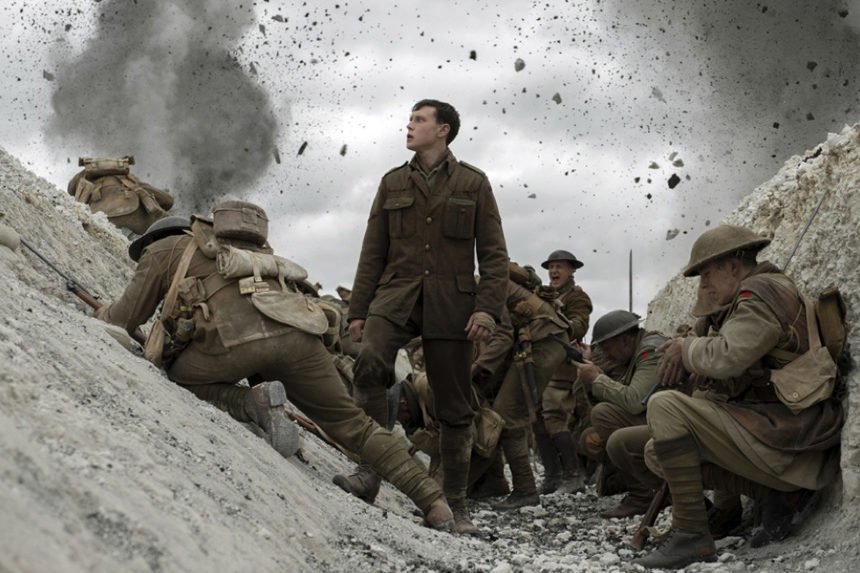1917
⭐ ⭐ ⭐ ⭐ ⭐
Rating: R
Run Time: 1 hour 59 minutes
Stars: Dean-Charles Chapman, George MacKay, Colin Firth, Benedict Cumberbatch
Writers: Sam Mendes and Krysty Wilson-Cairns
Director: Sam Mendes
The cinematic experience has sometimes been described as a semi-dream state, where surroundings and other people seem to slip away and the mind enters an altered state of consciousness; a world jointly created by the semi-dreamer and the filmmaker.
There comes a moment in 1917, Sam Mendes’ fiercely focused yet apocalyptic view of World War I, when I found myself almost mystically absorbed into the onscreen realm. It is the middle of the night. We are in a bombed-out French town. Crumbling walls rise to our right and left; the way ahead is veiled in murky darkness. All of a sudden, the air is pierced by brilliant white light from above, as if the sun has awakened from a nightmare. It is the light of a phosphorous flare, swinging from a parachute. We never see the flare itself, just its garish light sharply illuminating the rubbled landscape, the impossibly inky shadows growing and shifting like gloved fingers as the torch rapidly descends.
Through this hellscape dashes a lone soldier, two hands grasping his bayonetted rifle, lurching from shadow to shadow. But the cover of night is gone. Soon he is being chased. Ratlike, he scurries through the brick-lined maze, ducking around one corner after another, but he simply cannot shake the incomprehensible shouts and rattling gunshots at his heels.
And that’s just five minutes of 1917, a film that deposits us at the Western Front, then pushes, pulls, and pursues us for two hours through the nightmare that was the War to End All Wars.
The film opens on an unexpectedly idyllic note: Two young British soldiers, Corporals Blake and Schofield (Dean-Charles Chapman and George MacKay) are relaxing beside a broad green field, chatting amiably, when they are summoned to the bunker headquarters of their commanding general (Colin Firth). The officer informs Blake that, 18 miles across enemy lines, a British regiment is about to march into a German trap. With communication lines down, the only way to prevent absolute carnage is for the two of them to get there by foot with a warning, and to get there before morning.
As added incentive: Blake’s brother is in that unit. He’s not just saving more than a thousand soldiers from certain death; he’s preserving his own flesh and blood.
And so these fellows, fear etched into their faces, jump over the lip of their foxhole, slip through the barbed wire, and trudge off into No Man’s Land.
Much has been made of the choice by Mendes (Skyfall) to present the story as if it were a single long tracking shot, and credit his longtime cinematographer Roger Deakins and editor Lee Smith (Inception) for making the seamless transitions that sustain that illusion.
The technique adds a sometimes unbearable immediacy to the story as Blake and Schofield try to strike a balance between duty and self-preservation. Narratively, it also requires that the film follow a relentlessly eventful course: 1917 is composed of one startling set piece after another involving, among other trials, a crashing biplane, a booby trapped bunker, a raging river clogged with bloating bodies — and that late-night scramble through an enemy-held town.
While in some ways 1917 speaks the visual language of a current-day shooter video game, the performances elevate the film to almost operatic drama. MacKay and Chapman, their baby faces smeared with blood and mud, convincingly toggle their characters between horror and blind determination. As the commanding officers who bookend the action, Firth and Benedict Cumberbatch embody the wearying perpetuity of war. And a word must be said of the absolutely essential small role played by Claire Duburcq — the sole woman in a cast of nearly 100 — who floats into the narrative like an angel of mercy for the characters and audience alike.
Oh, yes, and you: Mendes may as well include your name in the credits, as well. After all, 1917 is one of those rare films that draws you into the screen and holds you there, an active participant wholly invested for every blistering, in-your-face second.
Featured image: Scene from Sam Mendes’ 1917 (Francois Duhamel/Universal Pictures)
Become a Saturday Evening Post member and enjoy unlimited access. Subscribe now



